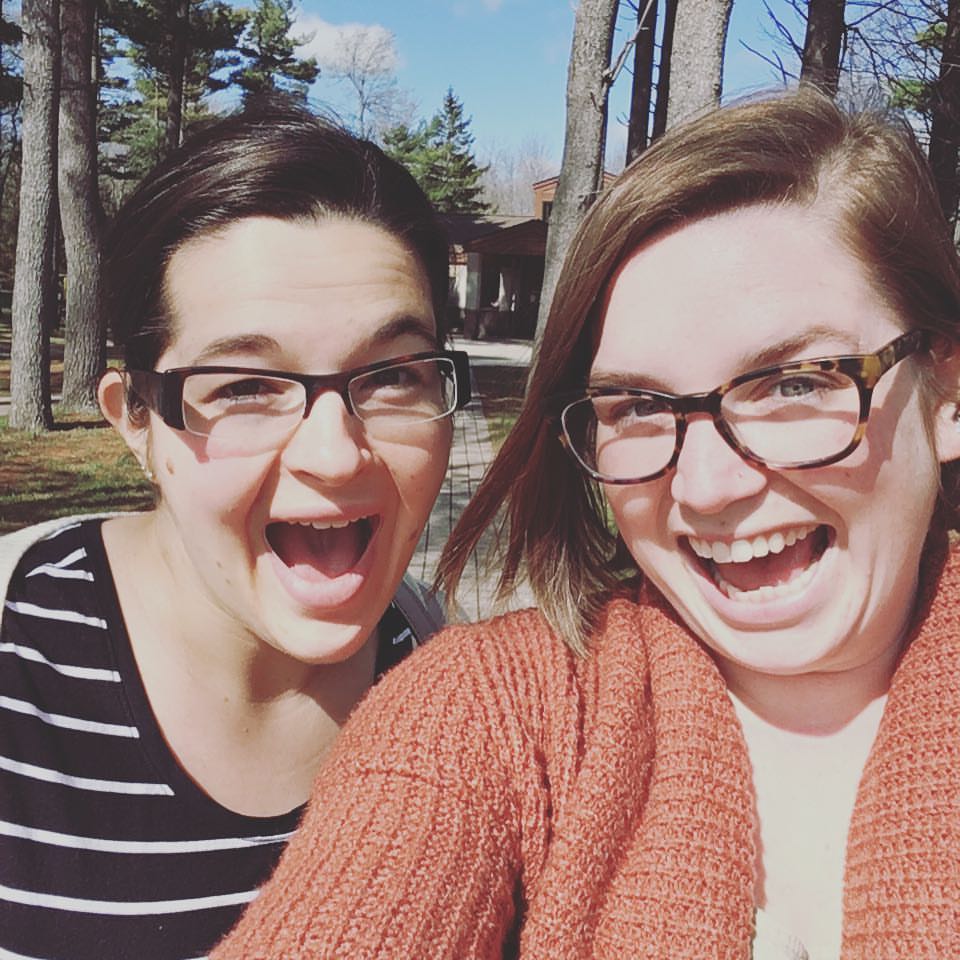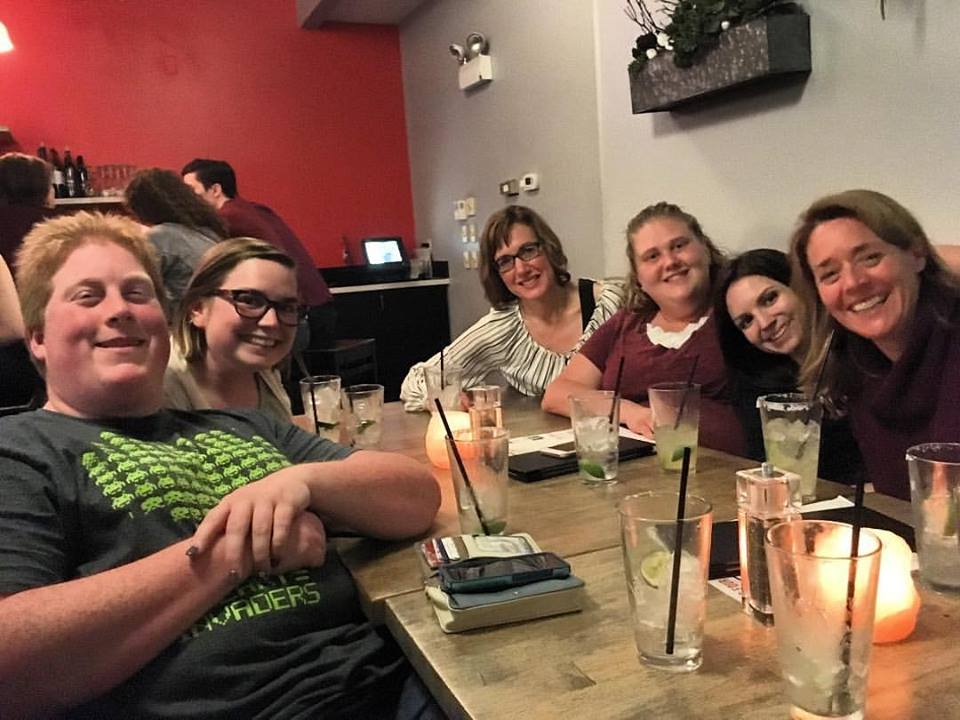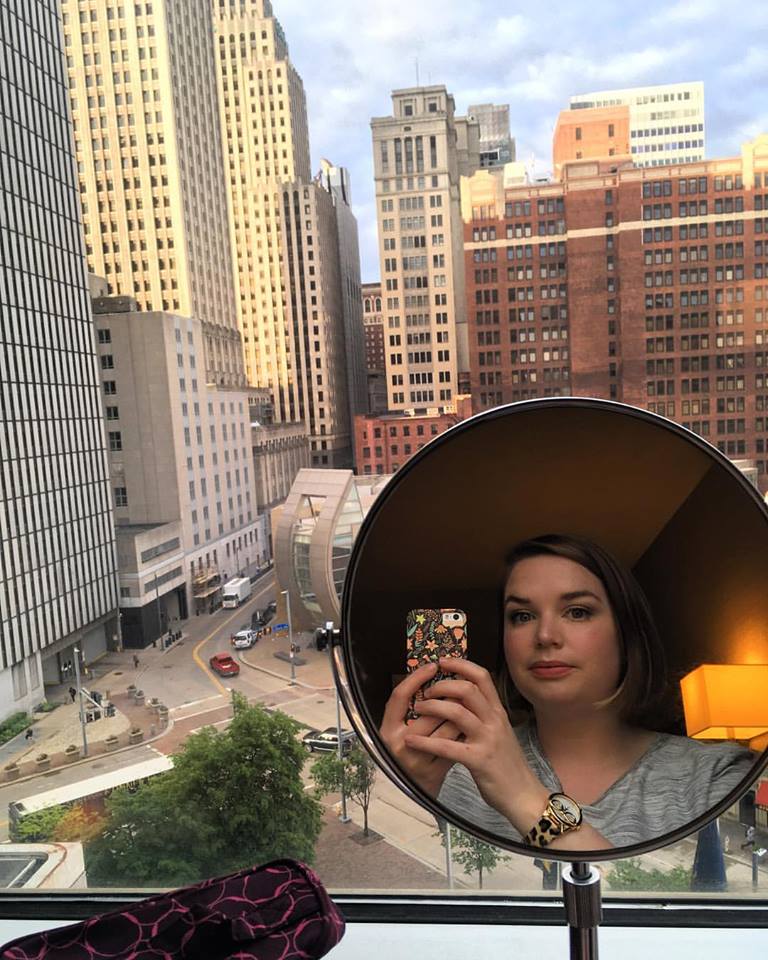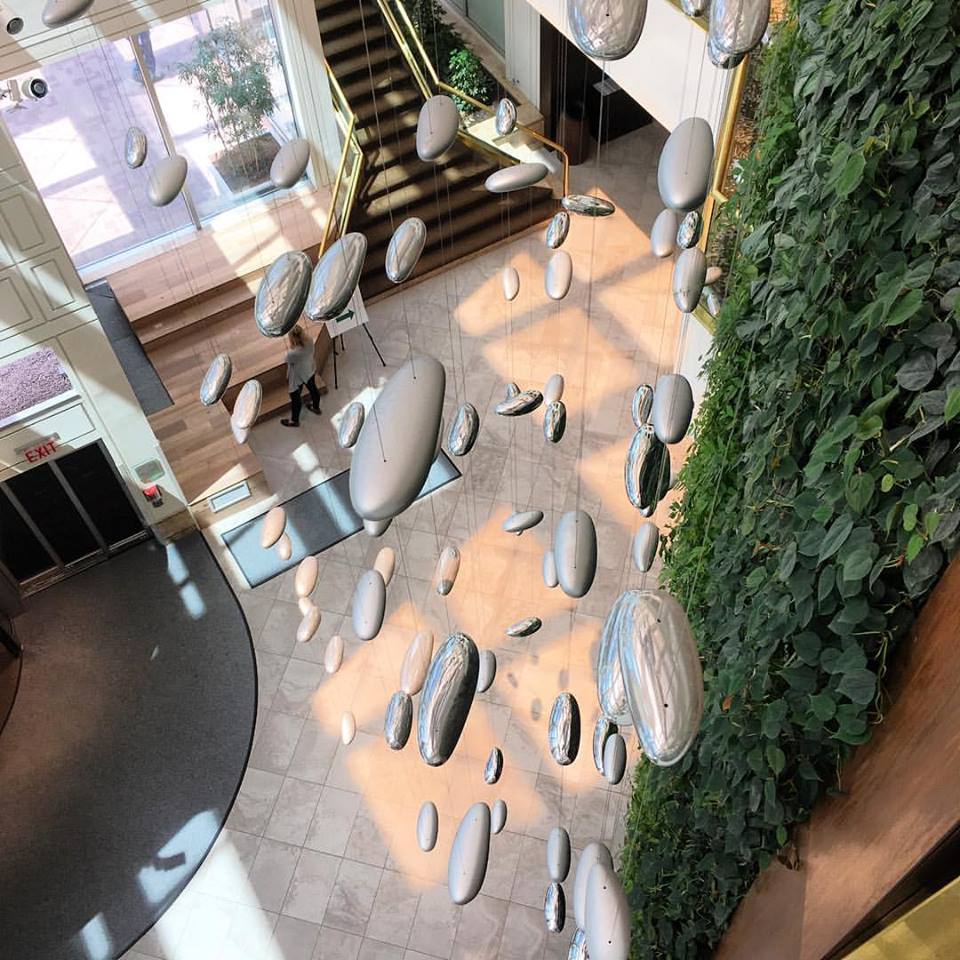The end of the Spring semester is a nightmare for academics most of the time, and it was especially so this year as I was finishing out my 1st full year at Paul Smith’s College and planning to conference the last week of the semester. Between visiting students in the residence halls, staffing the main desk during extended hours, and of course finishing up our presentation slides, I was pretty exhausted before we decided to trek nearly 12hrs by car to Pittsburgh, PA. But, I had never been to LOEX and after hearing so many great things about their program curation, I was excited for some really great, quality programs.

Back in February or so, my co-worker, Meggan Press and I learned that we were accepted to present our workshop, Everything in its right place: Effective, Strategic, Differentiated Outreach. We were super excited because we definitely had a great idea and LOEX has a pretty low acceptance rate at about 35% (just a smidge higher than ACRL). We thought for sure we were gonna kill it, and I think it was pretty successful – we had a little over 40 attendees, and even though we haven’t quite gotten our comments back from participants, lots of people were coming up and talking to us about the workshop. Eventually it’ll be published in the LOEX conference proceedings – available FOR-ev-ER in case you ever decide you want to read it.
So, on to the fun stuff:

The first thing I did (after checking the hotel room for bedbugs because I’m neurotic and that’s okay) is pop over and have margaritas with my former Harrisburg Area Community College colleagues! It was so fun, and I pretty much hung out with them on and off during all of the snack breaks that LOEX provides. Do you guys even remember when I was an adjunct? It feels like forever ago, and yet all of us picked up conversations as if I was just there yesterday. It takes some special people for that to happen 🙂
But now that I’ve set up all that great stuff and before I get into my conference notes, I’ve got to say that I was mostly disappointed with the conference presentations. A few presentations went far too long to the point of overlapping into the next person’s presentation, and some ‘interactive’ sessions did little more than “think-pair-share.” I was really expecting more from what I consider professional instructors. I’m not sure exactly what I was expecting, but something. else.
I also noticed that lots of presenters seemed to think their audience was total newbies to the field. Maybe I’m being harsh, but I tried to go to sessions that were marked a little bit on the higher level – it just seemed overall, the programs were a little bit more geared toward LIS graduate students. Which isn’t to say it’s all bad, it just wasn’t what I thought I was getting myself into and I walked out of several sessions because of it. In fact this conference is really was got me to start looking into conferences in fields like User Design/Experience because I’ve started to feel like anything that has ‘for librarians’ in the title or in the assumed crowd, the information will be watered down. At this point in my career, I think that I ought to go to conferences that speak directly to what I do, not to me-as-a-librarian. I think that I’ve got enough analytical skills to take what I learn at a non-library conference and apply it to what I do and how I can apply it to my patrons without having another librarian mediator speaking to me at a ‘librarian conference’ in a layman version.

Friday
Engaging Diverse Learners
Emili Vrbancic (UC-Colorado Springs)
- Ask yourself “who am I including, who am I excluding” – this got me thinking about how I approach teaching in the classroom. There’s so many different kinds of students and abilities in the room, it’s hard to know where to focus
- Universal design focuses specifically for students with disabilities
- 11% of undergraduates have reported disabilities
- But, reporting disability isn’t mandatory in higher ed
- Universal design for IL
- Equitable use – content in multiple formats, using sans-serif fonts, vocalize actions while showing
- Flexibility of use – vary methods, appeal to varying learning styles (are learning styles still a thing though?)
- Simple and Intuitive – yes this should be all the time
- Perceptible info – shorten task instruction
- Tolerance for error – give 1/3 of class-time for individual work, encourage more help
- Low physical effort
- Pay attention to size and space and approach of room
- Create a community of learners
- Did pre-post test (my note: ugh there has got to be something BETTER than this idea of pre and post tests)
Reaching over the Fence
Julia Feerrar @Virginia Tech
Rebecca Miller @Penn State
- Presentation focused on developing strategies to work with contingent faculty/ like adjuncts, visiting professors, etc.
- Strategies for reaching contingent faculty: shift thinking about adjuncts and have an empathetic approach
- Be sensitive to pressures and limited resources
- recognize unique experiences and skills
- articulate shared goals and challenges
- Try integrating with existing training groups and seek opportunities to mentor
- Faculty are just another group of learners
- Be flexible
- Provide a toolkit for them including sample lesson plans and info on how to scaffold
- Start convos and seek opportunities to listen
Remix: Combining motivation design with problem-based learning
Lindsay Roberts @University of Colorado–Boulder
Libguide for presentation
- Problem-based learning – must be complex, no 1 correct answer, student-learning should be self-directed and authentic.
- ARCS + Motivation design – Attention, Relevance, Confidence, Satisfaction
- Suggested another pre-post test for students
- Suggested using non-subscription databases to teach students the skills they’ll need outside of college
- Framework concept: searching as a strategic exploration

Saturday
Making the case for Credit Courses
Lydia Ellis @University of Northern Colorado
- Credit course seemed like a standard credit bearing LIS course
- Assessment involved pre- and post- test, a paper analysis, GPA-retention, and student perception (my note: there has got to be a better way for assessing this stuff)
- Faculty member who also presented with librarian was VERY happy that the librarian was teaching his students APA. My thoughts on this: teaching citation has no value to life-long learning, and I have a problem with librarians ‘owning’ citation. Should we? After all, the faculty in the field should be expert researchers in their field and therefore very familiar with citation styles and even more familiar with what they want from their students. So why is it that this tedious task falls onto the librarian, that actually does nothing to teach students valuable framework concepts? Why should we be teaching how to fill in the blanks of a citation? Frankly I don’t think we should. Maybe we could teach students to figure out some of this themselves through a problem-based learning exercise, but I will never again stand before a class and be like ‘Now this is the author, you put this name at the beginning of your citation, OK?’ No. We are trying to move beyond that and teach students actual concepts for using information, not just how to write down where you got it from. And really, with the almost ubiquitous use of discovery services, does it actually matter? I know, I know, this is controversial, but I don’t care.
Breaking Good: Becoming integrated into student learning communities
Millersville University
- Arguably the best presentation I went to the entire conference
- Don’t just go into a new community guns-blazing ask “How am I going to approach this community?”
- 4 themes:
- Timing – users have very different ideas about ‘point-of-need’ than us
- Local context – This is critical. 1 presenter said that she approaches this theme as an anthropologist (well, because she is one). You have to do your research about a group and find a trusted member to help you break into it.
- Endorsement – this is the person-to-person stuff. You want to create relationships with people where they will go out and endorse YOU. My thought: This is where Meggan’s moves management philosophy is really going to play a meaningful role with faculty where we create deep, lasting, and sustainable partnerships.
- Relationship-building: TAKES TIME, quit stressing
- Do some asset mapping: Who do you have on your team, and what can they bring to the table. In fact, how to we strategize to get to the table?
- We need to move from the rhetoric – ‘YOU NEED THE LIBRARY’ to asking students what talents and gifts they bring to the table ❤
Connecting libraries to metacognition, student learning, and student success
University of Minnesota
- Very basic presentation on basically the definition of metacognition (understanding how you understand)
- Went over the differences between cognitively passive and active activities
Are you HIP: Building the value of libraries with high-impact practices
Ngoc-Yen Tran @University of Oregon
- Definition of HIPs, gave examples of HIPs
- First year classes
- Common intellectual experience
- Learning communities, etc
- At University of Oregon, they worked with First Year Experience class – played a game like the Amazing Race, worked with living-learning communities, and created an Enhanced Research Skills Certificate Program for undergraduate students (I thought that last one was super interesting).
On playing with FIRE
Cathryn @University of New Hampshire
- My 2nd favorite presentation of the conference and the last one of the day! (I got a shrinky-dink giveaway/swag)
- Created a game with Green Door Labs for the library’s component of the Univ’s 1st year experience class (which is an entire academic year class).
- Winners of the overall game got $500 scholarships – which is a small enough incentive to make it possible at most institutions, but big enough for students to get competitive over.
- Librarian partnered with student to create game and integrated ‘Scholarship as Conversation’ frame
- Essentially it was an ‘escape the room’ game
- Basically, students that were in this FYS class, had to work as a team throughout the entire academic year to earn points both through attending various campus events individually and as a group. The game the librarian and student created was engaging enough where a person was in a room and had to look for clues to get out of the room. Essentially once all the clues were collected, a key appeared and you were let out of the room. Students earned points within the game so they were incentivized to keep trying to finish the game to earn more points.
- This would work well at Paul Smith’s as we’re trying to keep students around here on weekends and to attend more events. If it was built more into their classes or FYS class, perhaps they would actually attend those things and become more integrated into campus culture and start writing the pages for how we envision campus culture being in the future.
And then…
I spent the rest of my time in Pittsburgh exploring and hanging out with my best friend from high school – Hi Billio!
And then Meggan and I drove home, tried to find the outlets, got lost, ended up at the fanciest mall ever, smelled bath-bombs, got headaches, stopped at Sheetz because MTO-yes, drove forever, saw lots of dead animals on the road, swerved a groundhog, laughed, finally arrived back home in the Adirondacks.
The End.









2 responses to “LOEX 2016: Grumpy conference notes and other things”
I am definitely going to explore the idea of a certificate program-with digital badges. I just completed a technology course through the college where I work and digital badges really motivated students. I also am going to think about working with the foundation at our college to offer scholarships for students to complete some kind of skills workshop. Thanks for posting these comments!
LikeLike
Yes, even when the presentation wasn’t the best, there was always a little nugget of possibility. I love that you’re thinking about the certificate program. I thought that was especially intriguing, too. AND the FIRE game was pretty awesome and might work well. I’ve already started talking to my director about perhaps pitching the idea of scholarships to the administration. Seems like a really great thing for students.
LikeLike